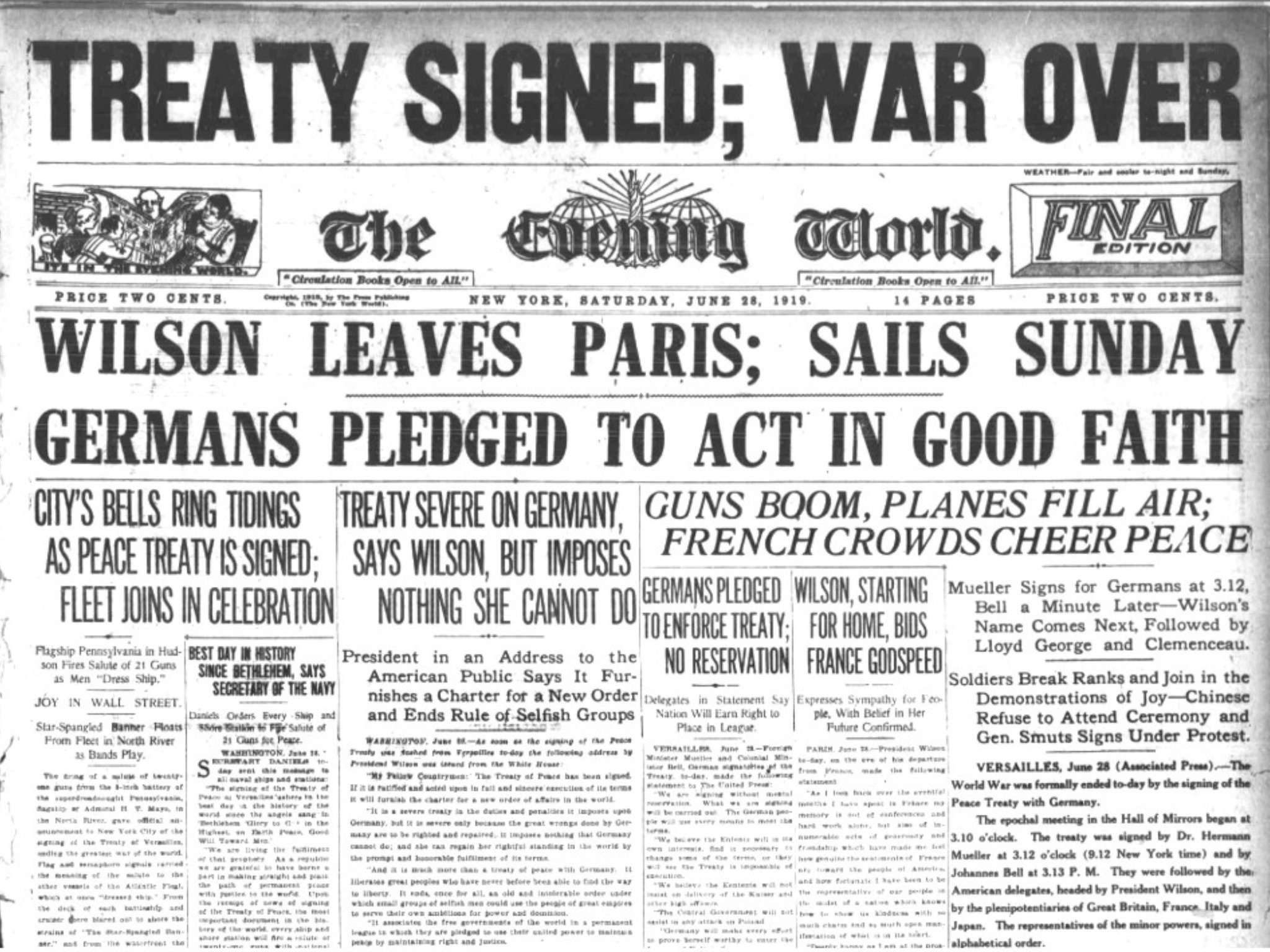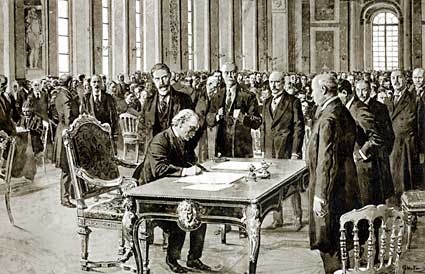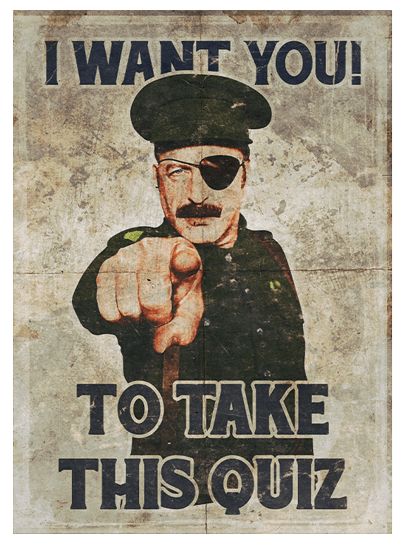Versailles
The Treaty of Versailles was one of five treaties signed by the Central Powers that ended the First World War. These treaties were a result of the Paris Peace Conference that began in January 1919.
In 1919, the majority of the world had not yet achieved the concept of democracy but lived in dependencies under ruling families. Of those countries that had become nation states or constitutional monarchies, only four of them, New Zealand, Denmark, Finland and Norway, were full democracies with universal suffrage. At that point, France and the USA, for example, were still not full-fledged democracies since women did not yet have the right to vote.
People demanding a say in their nation’s own destiny inevitably created national and international conflict, and this was a major topic of the Paris Peace Conference, which was held without the involvement of the defeated Central Powers.
Negotiations commence
The Allies negotiated among themselves through the winter and spring. The top representatives from first the council of ten and then the big four met nearly 150 times to make decisions that the general assembly would then ratify. The ‘minor’ nations were able to make recommendations, and some did become part of the various treaties.

The Treaty of Versailles with Germany was signed on June 28, 1919; The Treaty of Saint-Germain with Austria was signed on September 10, 1919; The Treaty of Neuilly with Bulgaria was signed on November 27, 1919; The Treaty of Trianon with Hungary was signed on June 4, 1920; and The Treaty of Sevres with the Ottoman Empire was signed on August 10, 1920.
British historian, David Stevenson wrote: “The peace treaties were the pre-eminent political legacy of the conflict. The struggle to enforce them was the central issue in postwar international politics.”
Following the signing of the treaties, a number of nations were left unsatisfied. Italy, which suffered great casualties in the war, didn’t achieve most of its major war goals, even though the country won. Many of the French believed that the treaty wasn’t harsh enough on the losers. Japan didn’t acquire all the territory in China it wanted or the clause on racial equality on which it had insisted. China felt betrayed because Japan got to keep some Chinese territory, but China was an Ally too. King Faisal didn’t get his United Arabia and was caught up in a complicated system of colonial mandates between France and Britain. The British promised him that he would get what he wanted if he signed the Faisal Weismann agreement, guaranteeing a Jewish State in Palestine, as outlined in the Balfour Declaration.
Meanwhile, US President Woodrow Wilson was interested in rebuilding the European economy, but he was more idealistic about free trade, self-determination and mandates for former colonies. At the top of his list was creating a League of Nations to ensure world peace. Ironically, the US Senate would refuse to ratify US membership in the League of Nations, so in the end, what the US President created continued without US participation. Wilson also opposed any harsh treatment of Germany, but France and Britain overrode this. The treaty of Versailles required that Germany “…accept the responsibility of Germany and her allies for causing all the loss and damage” of the war.
The ‘War Guilt Clause’
 This was the ‘War Guilt Clause’, which was in all of the treaties, but these were the general terms of the Treaty of Versailles. It was the justification for the reparations following an ‘if you broke it, you fix it’ concept.
This was the ‘War Guilt Clause’, which was in all of the treaties, but these were the general terms of the Treaty of Versailles. It was the justification for the reparations following an ‘if you broke it, you fix it’ concept.
Germany would have to cede Alsace-Lorraine to France. They would have to recognise Czechoslovakia and Poland, and give up land to them, as well as give up colonial holdings in Africa and the Pacific, though those had been lost during the actual war.
By March 1920, the German army could number no more than 100,000 men. The general staff was dissolved, all arms trade was banned, and limits were imposed on the manufacture of war materiel. The navy is trimmed to just 15,000 men and Germany was not allowed to have an air force at all. There would be reparations to pay, but it would take time to determine just how much.
Talk about reparations
There was a lot of talk about reparations, particularly for the Germans, though the other central powers had to pay them as well. The issue was often viewed as one of ‘fairness’ or ‘unfairness’, or about their effect on the German economy. The German economy collapses postwar, and in the early 1920s, the country suffers from hyperinflation, but there was a much more significant culprit for that than any amount of reparations — Germany fought the entire world war on credit.
While France and the US raised taxes to pay for the war, Germany did not. The country took millions upon millions of loans to finance the entire four years of the world war to fund all of the equipment and weapons, while all of the supplies and offensives were made by millions of soldiers. Germany took these loans because it didn’t even consider the possibility of losing the war. It believed it could pay back its dept with the spoils when it won the war — but it lost.
In November 1918, Germany was the last man standing of the Central Powers. The Western Front — the final active front — was collapsing and several million soldiers from the Allied nations were marching unopposed up through the former Austro-Hungarian Empire toward Bavaria. The Central Powers lost the war.
It was former German Army Chief of Staff Paul von Hindenburg and Quartermaster General Erich Ludendorff who had run a virtual military dictatorship of Germany in the latter stages of the war, and who very well knew that they lost the war, who really spread the myth that Germany was ‘stabbed in the back’ and defeated by elements at home and not by their own military failure to defeat the enemy. Ludendorff was eventually the co-star in Adolf Hitler’s Beer Hall Putsch, a failed coup d’état.
But the stab in the back myth served several purposes, not just ego. If you didn’t really lose the war, then any reparations, no matter how large or small, would be unfair. In fact, imposing them on an undefeated enemy would be humiliating. It was this, of course, that became one of the rallying calls of the Nazis. And since modern Poland, for example, was created by the treaty, Hitler did not recognise the Polish border.
In terms of amounts, the reparations were not unprecedented. Germany ended up paying less for World War I than the French had paid in 1871 after losing the far shorter Franco-Prussian war that was fought on their own soil. Frenchmen remembered that well in 1919, and many of those were at the Paris Conference.
A year earlier, in 1918, after Russia had pulled out of the war after the revolutions, Germany forced the Brest-Litovsk Treaty on the Russians, which really was completely mortifying, so no one showed a shred of sympathy when 15 months later the Germans complained that “this it too harsh.”
A period of hyperinflation in Germany
In the hyperinflation period in Germany a few years later, it got to the point where someone’s entire life savings could only buy a loaf of bread if they were lucky, and the Allies did not accept reparation payments in worthless inflated German currency. They wanted something backed in gold. Germany asked for a moratorium on payments until they could get their economy efficiently up and running again. Britain allowed this but France refused.
Germany did eventually sort out its economy and the second half of the decade was referred to as the Golden 20s, but by then the damage was done — the so-called unfairness of the reparations and the illegitimacy of the treaty as a whole would be a rallying call in Germany in the 20s and 30s, especially by Hitler and the Nazis, although they did not became a major political party until the 1930 elections, many years after hyperinflation was over.
As for other nations’ view on the subject, well Belgium, which was neutral, was invaded by millions of German soldiers, because it was on the way to France. 95 per cent of Belgium had been occupied for four years; it was stripped of its resources and its industry, and 120,000 Belgians had been deported to work in Germany. Those who remained certainly had no real civil liberties during occupation, so while many people often wondered what the purpose of the war was, the Belgians didn’t, and they didn’t just want their land back, they wanted revenge and they wanted security. This is what they expected from the peace settlement.
National self-determination
Meanwhile, one big thing that US President Wilson was really trying to push was national self-determination. Every national ‘race’ should have its own lands. Considering that the US was a nation made up of immigrants though, Wilson’s stance against multi-ethnic empires or nations was somewhat inconsistent, but in practical reality, the borders that were now drawn for these new nations caused 30 million Europeans to end up on the wrong side of their new national border, and that would have a huge effect on Europe over the next 20 years.
What had been Austria-Hungary was divided into a variety of nations, but even the new Republic of German-Austria, which soon became the Republic of Austria, and Hungary themselves, were very much reduced in size. Both were now landlocked without ports and Hungary was just 28 per cent of its former size. Bulgaria also had to give up land, but not nearly as much. Army sizes were restricted for all of them. The treaty with the Ottomans was never ratified by anyone, though, let alone enforced. Mustafa Kemal and the Turkish nationalist movement had created a state that was deemed to not be a successor state to the Ottoman Empire, and thus was not blamed or punished for the Great War.

But signing a treaty and then enforcing its terms were two different things.
It was clear that the Germans would not voluntarily comply with the Treaty of Versailles so the Allies had to think about continuing military occupation or enforcement at a time when their soldiers desperately wanted to go home and get on with their lives. In many ways, the Allies real failure with Versailles was the lack of resolve in enforcing its terms. In and of itself, the treaty certainly isn’t an inevitable link to WWII.
There could have very well been a reconciliation with Germany, which could have continued to have been kept militarily powerless, but the biggest problem facing the allies after the treaties was disunity. Russia and the Bolsheviks were unapproachable since the Allies had bet and lost on the Whites winning the Russian Civil War. Italy and Japan became unapproachable over time, and the US, France and Britain stopped cooperating with each other simply because they had different long-term goals.
All powers had a selfish national agenda too. Britain, for example, had acquired pretty much everything it wanted from the treaties, so if Italy or the US, or whoever was unhappy, it wasn’t really their problem.
What Georges Clemenceau told the French Parliament was deemed pretty accurate: “The treaty will be what you make of it.” Hitler made a lot out of it, but if the reparations had been smaller, or even non-existent, he would have still made a lot out of it.
Facts and events can be twisted and turned to reverse engineer things to claim that X caused Y, but there really is one way that the Treaty of Versailles did lead to WWII — it was not enforced. Had it been enforced in the 1930s, Hitler’s Germany would not have had the military force to attack anyone, but it was not enforced, because no one in French or British Command could predict that anyone who had gone through the hell of the the First World War would ever want another. They were wrong.
The Treaty of Versailles inspired our song ‘ Versailles ‘, which is featured on our album The War To End All Wars. Take a look at the lyrics we wrote here.
If you’re interested in a more visual interpretation of this story, watch our Sabaton History episode, Versailles – “It will be what you make of it”:





















